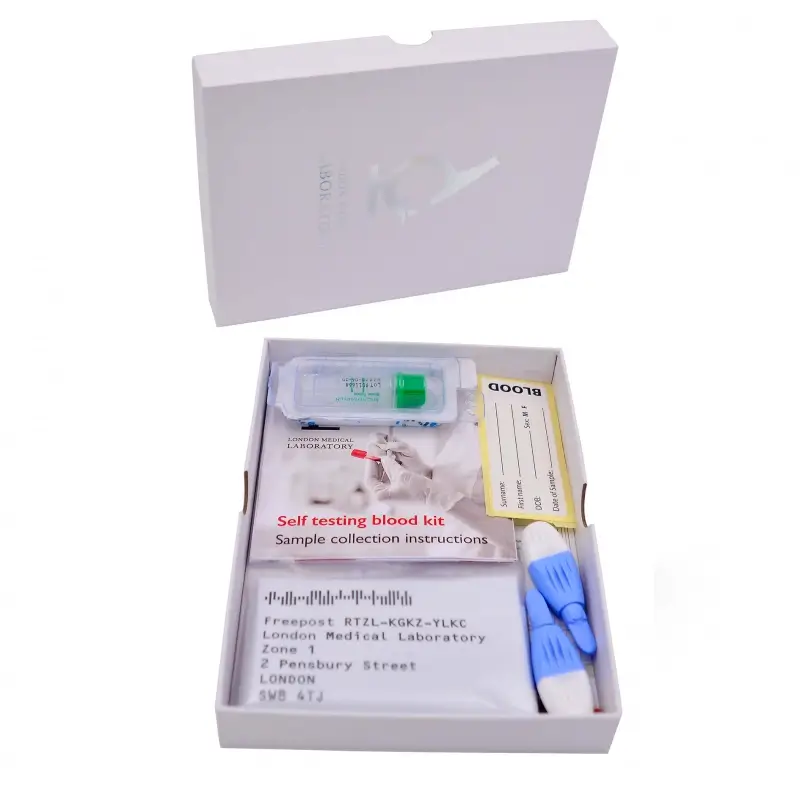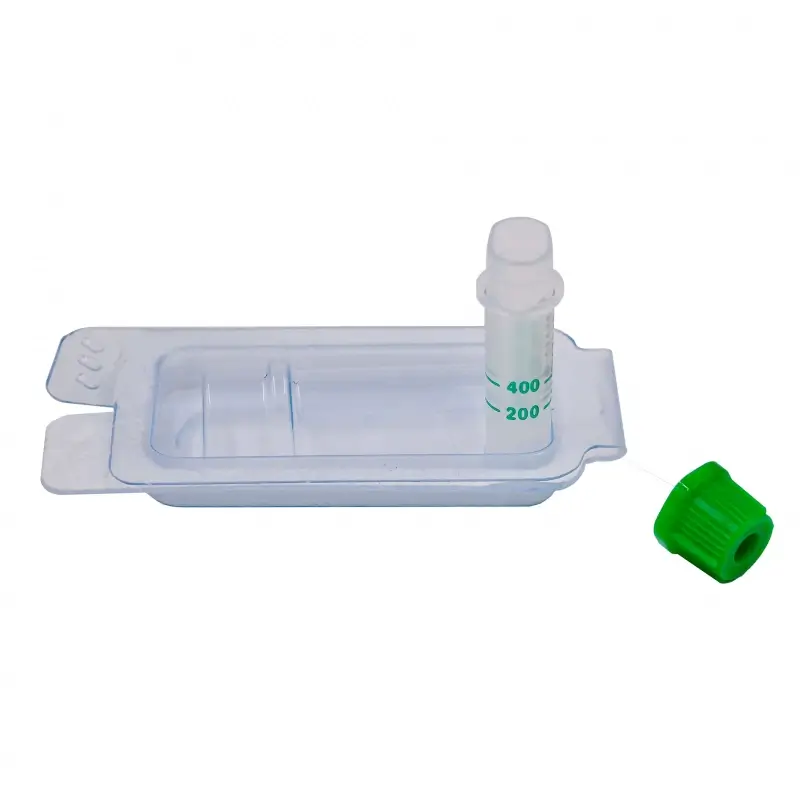
Compressive health check for men
We have partnered with London Medical Laboratory to provide you with this comprehensive health check. Please contact or drop into your local pharmacy to confirm the price and book your appointment.
Introduction to Well man
Well Man Profile is the most complete general health blood test for men.
How does this test work?
Blood tests can be an excellent way to screen for underlying health concerns and to monitor pre-existing known conditions.
Whether you are managing a pre-existing health condition, you have concerns regarding your general health or you are simply curious about what your blood may be able to tell you, a straightforward blood test is an efficient and affordable way to take charge of your health.
Our pharmacies offer in-store blood test appointments that are designed to make the process as convenient, stress-free and straightforward as possible.
Following your appointment, you can expect to receive your results within 7 days.
Please note: this blood test should not substitute seeing your own doctor regarding any health concerns you may have, especially if you have symptoms that are causing concern. It is imperative not to make a clinical diagnosis or begin a treatment without consulting with a fully trained healthcare professional.


What do you test?
Blood Cells (1 Biomarker)
1. Full Blood Count (FBC)
Full blood counts are often used to provide an overview of your general health because a variety of issues can be detected, including anaemia, infection, and leukaemia. Full blood count tests analyse white blood cells, red blood cells, and platelets, which provides an overall snapshot of your health. Your FBC will list a number of markers, including neutrophils, mean platelet volume (MPV), and lymphocytes.
A full blood count can only be provided by making an in-pharmacy appointment, as it is not possible to run this test using just a finger prick blood sample. It is also important to note that certain medications and conditions may impact your FBC results, which is why it is vital to discuss your test results with a qualified medical professional.
Cholesterol (6 biomarkers)
High levels of cholesterol in the body can lead to blocked arteries, which if left untreated could cause a stroke, heart attack or coronary heart disease. If you discover that you have high cholesterol, you will be provided with dietary and lifestyle advice that can help you to improve your health and reduce the risk of serious illness.
1. Total Cholesterol
This biomarker measures the total amount of cholesterol present in your blood. This test is used to determine whether you are at risk of developing a serious heart issue.
2. High Density Lipoprotein (HDL)
HDL is often thought of as a ‘good’ cholesterol because it is able to remove the ‘bad’ cholesterol from the arteries in the heart.
3. Low Density Lipoprotein (LDL)
LDL is the aforementioned ‘bad’ cholesterol, which can build-up in the arteries and potentially cause blockages. High levels of this form of cholesterol can increase your risk of experiencing a heart attack, stroke, or developing heart disease.
4. Total Cholesterol: HDL Ratio
This calculation compares levels of ‘good’ cholesterol with your overall total cholesterol, which can give an idea of how equipped your body is to remove ‘bad’ cholesterol and keep your arteries clear.
5. Non-HDL Cholesterol
This biomarker is calculated by subtracting HDL cholesterol from the total level of cholesterol in the body. Essentially, this will tell you how much ‘bad’ cholesterol is in your body, which can be helpful in determining your likelihood of experiencing heart disease.
6. Triglycerides
Triglyceride is a form of fat that is stored in the tissues of the body, which is often derived from foods including oil and butter. Triglycerides are released by hormones to provide energy for the body between meals. If you have high levels of triglycerides, you may be at an increased risk of stroke or heart attack.
Diabetes (1 Biomarker)
1. Haemoglobin A1c (HbA1c)
A HbA1c test looks at your blood sugar levels over the last 8 to 12 weeks and is frequently used to diagnose and/or monitor diabetes. This test measures how much glucose is attached to the haemoglobins present in your red blood cells. This biomarker can be used as a screening tool for prediabetes, as well as to support the diagnosis of type 1 and type 2 diabetes.
Hormones (1 Biomarker)
1. Testosterone
There are many different types of hormones that help the body perform an array of processes and functions, including regulating appetite and metabolism, supporting growth, and fertility. Sometimes a hormone imbalance can occur, which can cause a variety of symptoms.
In men, testosterone helps to maintain muscle mass and regulate the sex drive. A testosterone test can be used in the diagnostic process for a range of different conditions, including infertility and erectile dysfunction.
Inflammation (1 Biomarker)
1. High Sensitivity C-Reactive Protein (hs-CRP)
Inflammation occurs when white blood cells are prompted into action to shield the body from infection-causing viruses and bacteria. During instances of inflammation, levels of CRP increase in the blood.
Please note that the hs-CRP test differs from the standard CRP test, which is often used to identify diseases that cause inflammation. The hs-CRP test measures much lower concentrations of CRP, which can help to predict the risk of stroke and heart disease in people who have not previously been diagnosed with one of these issues.
Iron Studies (6 Biomarkers)
Iron deficiencies can lead to a number of different symptoms, some of which can be extremely concerning including shortness of breath, chest pain, and fatigue.
1. Iron
The body uses iron to make new red blood cells, which are responsible for transporting oxygen around the body. This biomarker measures the total amount of iron present in your blood. High levels of iron can be indicative of liver disease, whereas low levels may indicate that you have anaemia.
2. Total Iron Binding Capacity (TIBC)
The TIBC test highlights the maximum amounts of iron that your blood can transport, which can be helpful when diagnosing iron related conditions including anaemia and haemochromatosis.
3. Unsaturated Iron Binding Capacity (UIBC)
UIBC highlights the amount of transferrin present in the blood that has not yet been attached to iron. Elevated UIBC may indicate an iron deficiency or malabsorption issue, whereas decreased levels may suggest anaemia, chronic illness or infection, haemochromatosis, or iron toxicity.
4. Ferritin
The protein ferritin is used to store iron and this biomarker can help you to understand how much iron your body can store. Ferritin testing is used to help diagnose a range of health concerns, including liver disease and anaemia.
5. Transferrin
Produced by the liver, transferrin is used to transport iron within the body. This biomarker is useful to understand your body’s iron status and can be used with the diagnostic process for conditions including anaemia.
6. Creatine Kinase
This enzyme can be found in numerous locations throughout the body, including the heart and skeletal muscles. The creatine kinase test can support the diagnostic and monitoring processes of muscle diseases and injuries.
Kidney Function (5 Biomarkers)
The kidneys are responsible for supporting a number of functions, including removing waste, keeping the production of red blood cells under control, and releasing hormones responsible for regulating overall blood pressure.
1. Urea
Composed of amino acids, urea is filtered out of the blood by the kidneys so that it can be excreted from the body in urine. This biomarker can provide an overview of how well your kidneys are functioning, as well as helping to determine whether either your liver or kidneys are being affected by disease.
2. Creatinine
Also a waste product, creatinine is produced as muscles contract. The kidneys facilitate the excretion of creatinine from the body and this biomarker is another way to understand whether your kidneys are functioning normally.
3. Glomerular Filtration Rate (GFR)
Glomeruli are essentially the filters used by the kidneys to remove waste from blood. This test can help to reveal and monitor any abnormal changes that may occur in the kidneys by estimating how much blood is able to pass through the glomeruli in your kidneys.
4. Calcium
In addition to being present within our bones, calcium also circulates through the body in our blood, where it plays a role in a number of functions including normal blood clotting. Testing your calcium levels can help to diagnose a range of conditions relating to the kidneys, heart and bones. This test measures both the calcium that is bound to albumin and the active calcium freely within your blood.
5. Adjusted Calcium
Also sometimes referred to as corrected calcium, this biomarker specifically measures the amount of calcium that is not bound to proteins like albumin. This test can be useful to understand whether you may be experiencing kidney, thyroid or bone disorders.
Liver Function (8 Biomarkers)
The liver performs a number of vital functions in the body, including removing toxins from the blood, fighting infection, and regulating blood sugar.
1. Albumin
Produced by the liver, this protein is responsible for allowing the blood to keep hold of important fluids,and it also plays a key role in the transportation of vitamins and hormones. If your levels are too low, you may have an issue with your kidneys or liver. Conversely, if your levels are too high, you may be dehydrated or experiencing an infection.
2. Globulin
Globulin plays a key role in supporting the overall functionality of the liver, particularly with regard to fighting infection and supporting normal blood clotting. In addition to supporting the diagnosis of kidney disease and liver damage, globulin can also help to identify certain autoimmune disorders if your results come back above the normal level.
3. Total Protein
This biomarker measures the total level of globulin and albumin in the blood serum. The proteins measured play an important role in the growth and overall health of your body’s tissues and cells. If your total protein is below the normal range, your body may be struggling to digest or absorb foods properly, or you may have an issue with your liver or kidneys.
4. Alkaline Phosphatase (ALP)
ALP is an enzyme and protein that plays a role in many bodily functions, including bone formation, protein breakdown, and mitigating inflammation. High levels could indicate kidney or bone disorders. However, it is generally used to look at the overall health of the liver, particularly in people who are experiencing symptoms including vomiting, unexplained weight loss, jaundice, and nausea.
5. Alanine Transaminase (ALT)
ALT is an enzyme that is found in the blood and the liver. High levels of ALT are triggered when liver cells sustain damage, so this biomarker can help to provide an overall assessment of your liver health.
6. Aspartate Aminotransferase (AST)
AST is an enzyme that can be present in the muscles, heart and liver, where it helps to support the conversion of food into usable energy. When cells containing AST become damaged, AST is released into the blood.
7. Gamma Glutamyl Transferase (GGT)
Another enzyme that is predominantly present in the liver but also in the spleen, kidneys, pancreas and gallbladder, GGT is used to metabolise toxins and transport amino acids. This biomarker can be used to detect disease of the bile ducts or liver.
8. Total Bilirubin
Bilirubin is present within bile, where it helps the body to digest food. Total bilirubin is a biomarker that can help to diagnose certain forms of anaemia and liver diseases. Both low and high levels of bilirubin can suggest that the body is not able to break down and remove old red blood cells optimally. However, there are a number of other factors that may result in higher than usual levels of bilirubin, including certain foods and strenuous exercise.
Thyroid (2 Biomarkers)
Despite being relatively common across the general population, thyroid disorders often go undiagnosed. Thyroid disorders can cause a range of symptoms, including problems controlling weight, regulating mood, and fatigue.
1. Thyroid Stimulating Hormone (TSH)
TSH is produced by the pituitary gland and stimulates the thyroid, where it helps to support muscle strength and regulate body temperature and weight. This test can help to detect whether your body is producing too much or too little TSH.
2. Free T4
Also known as free thyroxine, this hormone is produced directly by the thyroid and plays a role in numerous functions including growth and metabolism. Free T4 can help to indicate thyroid disease, such as hyperthyroidism and hypothyroidism.
Vitamins (3 Biomarkers)
Our bodies need vitamins to function properly, as they play a key role in the growth, development and functionality of normal cells.
1. Vitamin D
Although our bodies can convert sunlight into vitamin D and we can obtain it via foods and/or supplements, deficiencies of this important vitamin are actually very common in many countries around the world. Vitamin D is used by the body in numerous ways, including regulating the absorption of magnesium and calcium, and supporting bone health.
2. Vitamin B12
Vitamin B12 is essential for the body to form new, healthy red blood cells. It is also necessary to repair tissue and support nerve health. Vitamin B12 can be obtained by consuming animal products, including eggs, milk and poultry, and it can also be found in plant-based foods such as nutritional yeast, fortified cereals and plant milks, and some vegetables.
Low levels of vitamin B12 can cause an array of symptoms, including fatigue, tingling in the hands and feet, weakness, heart palpitations, and vision problems. Low levels can indicate anaemia, whereas higher than normal vitamin B12 levels may indicate blood disorders, autoimmune diseases, diabetes, and liver disease.
3. Folate or Vitamin B9
Folate is another vitamin required to support the formation of healthy red blood cells, as well as playing a role in cell and tissue repair. Folate can be obtained by consuming citrus fruits, yeast and leafy green vegetables, or by taking a supplement. Low folate levels can be indicative of anaemia and cause a number of symptoms including mouth sores, neurological issues, weakness and fatigue.
Please note that all blood test results should be viewed as part of a wider, more comprehensive picture. Often, certain biomarkers can be slightly below or slightly above the normal range without signifying a wider health concern. It is important to always discuss your blood test results with a qualified medical professional.
Contact your local Dears Pharmacy today to find out more about the Well Man Profile blood test and arrange your appointment.



